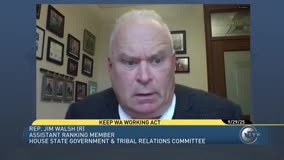Representative Walsh Discusses Supremacy Clause in Keep Washington Working Debate
September 29, 2025 | Legislative Sessions, Washington
This article was created by AI summarizing key points discussed. AI makes mistakes, so for full details and context, please refer to the video of the full meeting. Please report any errors so we can fix them. Report an error »

In a recent meeting of the House State Government & Tribal Relations Committee, significant discussions centered around the implications of the "Keep Washington Working" act and its relationship with federal law. The meeting highlighted concerns raised by Attorney General Bondi, who argued that the implementation of this state law could potentially obstruct the enforcement of federal laws, invoking the Supremacy Clause of both the federal and state constitutions.
The Supremacy Clause establishes that federal law takes precedence over state law when conflicts arise. Representative Walsh questioned whether the "Keep Washington Working" act, if found to conflict with federal law, would necessitate a reevaluation of its provisions. The response emphasized that the act explicitly states that it does not permit state agencies to interfere with federal law, thereby maintaining compliance with federal requirements.
The discussion also touched on the anti-commandeering principle, which prohibits the federal government from compelling state agencies to enforce federal laws. This principle has been upheld in various court cases where federal mandates were deemed overreaching. The representatives noted that "Keep Washington Working" is designed to ensure that state actions do not conflict with federal law, particularly in areas such as data collection and reporting.
Additionally, the meeting addressed a question regarding the American Civil Liberties Union's stance on voting rights for non-citizens. It was clarified that the ACLU does not advocate for non-citizen voting in elections at either the federal or state level.
Overall, the discussions underscored the ongoing tension between state and federal law, particularly in the context of immigration and enforcement policies. As these legal interpretations evolve, future court actions are anticipated to further clarify the boundaries of state authority in relation to federal mandates. The committee's deliberations reflect a critical examination of how state laws align with federal expectations, a topic that will likely continue to be a focal point in Washington's legislative landscape.
The Supremacy Clause establishes that federal law takes precedence over state law when conflicts arise. Representative Walsh questioned whether the "Keep Washington Working" act, if found to conflict with federal law, would necessitate a reevaluation of its provisions. The response emphasized that the act explicitly states that it does not permit state agencies to interfere with federal law, thereby maintaining compliance with federal requirements.
The discussion also touched on the anti-commandeering principle, which prohibits the federal government from compelling state agencies to enforce federal laws. This principle has been upheld in various court cases where federal mandates were deemed overreaching. The representatives noted that "Keep Washington Working" is designed to ensure that state actions do not conflict with federal law, particularly in areas such as data collection and reporting.
Additionally, the meeting addressed a question regarding the American Civil Liberties Union's stance on voting rights for non-citizens. It was clarified that the ACLU does not advocate for non-citizen voting in elections at either the federal or state level.
Overall, the discussions underscored the ongoing tension between state and federal law, particularly in the context of immigration and enforcement policies. As these legal interpretations evolve, future court actions are anticipated to further clarify the boundaries of state authority in relation to federal mandates. The committee's deliberations reflect a critical examination of how state laws align with federal expectations, a topic that will likely continue to be a focal point in Washington's legislative landscape.
View full meeting
This article is based on a recent meeting—watch the full video and explore the complete transcript for deeper insights into the discussion.
View full meeting
